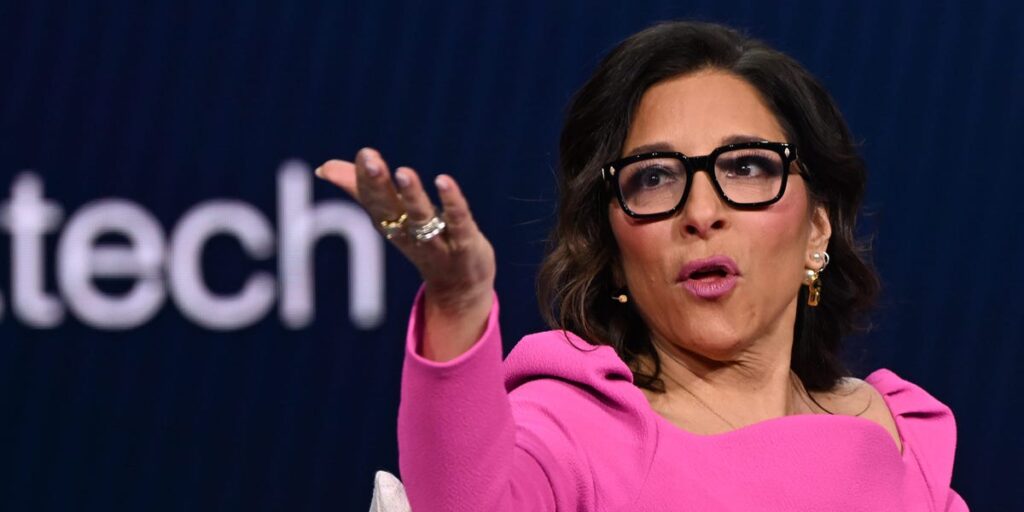- Elon Musk’s X — the thing we used to call Twitter — lost lots of advertisers after he bought it.
- Now he is trying to get them back and, reportedly, using the implied threat of government interference to do so.
- This seems like an opportunity for people concerned about government involvement in social media to pipe up. When will that happen?
Here’s a 100% hypothetical scenario: Say a Big Tech CEO calls up a big ad agency and tells them it’d be a good idea to spend more money with his company. Because if they don’t, he knows people in the US government …
I know, I know. That would never happen.
Except that maybe it has been happening. And the person who is allegedly sending that message is Linda Yaccarino, the CEO of X.
Which is, of course, owned by Elon Musk, who works for Donald Trump, donated more than $250 million to Trump’s presidential campaign, and also conducts joint interviews with him.
The Wall Street Journal reports that Yaccarino and her lieutenants have been pressing Interpublic Group, one of the world’s biggest ad agencies, to get its clients to spend more money on X. Hanging over IPG’s head: a proposed deal to sell itself to rival Omnicom, which may need regulatory approval in the US.
IPG execs interpreted X’s messaging as a reminder that the Trump administration could slow down that deal, according to the Journal’s veteran ad reporter Suzanne Vranica, citing several unnamed people close to the matter.
We’re just a month into Trump 2.0, and things are happening very quickly, so it’s easy to miss stuff. But I want to underline what could be happening here — because it’s extraordinary. Even by the extraordinary standards we’ve seen established in the past few weeks: A big media platform, whose owner is deeply enmeshed with the Trump administration, is — reportedly — telling companies to give it business, or risk government reprisal.
And if that’s true, that goes beyond the performative ring-kissing we’ve seen from Big Tech and other business leaders in the last few months. And beyond the settlements Trump has extracted from the likes of Disney, Meta, and X itself.
Those payouts stemmed from disputes between private companies and a private citizen who happened to have since become president of the United States. Now we’re looking at a world where the president’s allies could get special treatment, too. And people or companies who don’t bow to those allies could face retribution on government decisions that should be made on their legal merits.
Here’s what Interpublic told me when I asked if the Journal’s story was correct, which is what it also told the Journal. I’m publishing the response in full:
Our role is to recommend the most strategic media investments to our clients. These objective recommendations maximize business outcomes for brands and audiences. We continually work with a cross-section of media partners and believe a broad range of options delivers the greatest value and efficiency for marketers. We do not make spending commitments on behalf of clients to any partner or platform, and decision-making authority always rests with the client.
You may notice that there’s nothing in there arguing that the Journal’s reporting — that Interpublic executives believe Yaccarino and Co. were telling it to spend more to keep out of trouble — isn’t true.
I’m assuming that wording is very precise and specific. But just to make sure, I followed up to ask if IPG wanted to offer any additional comment. I haven’t heard back. I also haven’t heard back from the X press office.
And just to beat this into the ground: I also haven’t seen any public concern from the Trump allies who regularly complain that media and tech platforms are biased against conservatives, or that they’ve been too cozy with Democratic lawmakers. You’d think they’d be very upset about suggestions that a big platform used its ties to the president of the United States to coerce advertisers.
But there’s been nothing out of Jim Jordan, the Republican congressman who has spent years trying to root out supposed bias in Big Tech, and who now says he’s trying to root out supposed collusion between big advertisers to keep ad dollars away from X. (X is also making the same allegations in lawsuits it is filing against several would-be advertisers.) Nothing from Brendan Carr, Trump’s choice to run the Federal Communications Commission, who has said he wants to stamp out bias at big media companies and Big Tech companies. Nothing from Vice President JD Vance, who just lectured European leaders over the way they regulate social media while complaining that Joe Biden’s administration “threatened and bullied social media companies.”
But look. Like I said: This is extraordinary stuff — stuff we would have had a hard time imagining just a few weeks ago. So maybe I’m wrong, and people in Trumpworld are just finding out about these allegations and will be complaining loudly about them any minute now.
Let me know when you hear something.
Read the full article here


